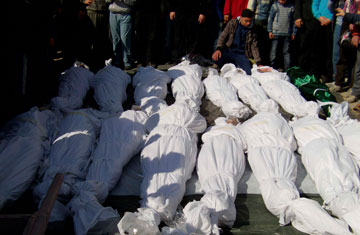
A burial ceremony in the Khaldiyeh neighborhood in the Syrian city of Homs on Feb. 4, 2012, for what activists say are victims of the killings by the Syrian army
(2 of 2)
"When will you recognize the National Council, the only one speaking in the name of these people?" he said referring to the SNC, which has received little international recognition, even from Arab states. He read out the names of "martyr heroes" as the huge crowd listened in silence. He stopped at 35. "These martyrs were identified. Others are in pieces, others are still unidentified," he said. "What do they want?" the young man continued, "either we kneel before Bashar's picture or ..." He was interrupted by thunderous chants of "We kneel only to God!"
Highlighting the angry defiance among protesters, the young man, who made no attempt to conceal his identity, looked up toward the camera perched high above the crowd: "We have not knelt [to] Bashar! Do you hear? We will not kneel to anyone but God! These people," he said, waving toward the crowd, "we are all martyrs!"
"The people demand the execution of Bashar," the crowd yelled. (Assad is not even referred to as the President anymore, even in chants calling for his execution.)
It's unclear what triggered the latest bloodbath, which happened shortly after an amateur video aired on Arabic satellite television channels showed 19 uniformed soldiers detained by the Free Syrian Army's Farouk Brigade in Homs, the same brigade that says it has seven Iranians in custody.
Syrian opposition members pointed to a cynical ploy by Assad's forces to try to out-and-out crush several stubbornly defiant neighborhoods in Homs, while Russia holds an increasingly agitated international community at bay with its threat of a veto over any Syria resolution.
Still, Homs wasn't the only city under siege at the start of the weekend. Activists were reporting large-scale assaults on Zabadani, a town on the outskirts of Damascus, which some two weeks ago negotiated a cease-fire with the regime. The towns of Rastan, near Homs, Darraya, near Damascus, and others were also reportedly being attacked by loyalist troops.
The 19 loyalists were captured when defectors overran their checkpoint outside a medical dispensary in Homs. The men are seated in three neat rows, and every man bar one (a former state security officer in a black leather jacket, the mukhabarat's default uniform) holds a laminated military ID card in front of him.
A voice off-camera mocks the soldiers. "If we were fighting teenage girls, the fight would have lasted longer. It didn't take 10 minutes. What's the reason? Don't you have anything to fight for? We always hear 'God, Syria, Bashar' on Addounia," the man off-camera says, referring to a Syrian state television channel. After a moment of silence, a loyalist who says he is from the Special Forces answers, "Bashar is in his palace leaving us here to get killed."
Most of the men are Alawites, although a few in the front row are Sunnis. "The regime is trying to create differences between the sects and start a civil war," the off-camera voice says. "And now we have Russia and its veto, do you understand me? So that a civil war will start between you and us. But it won't, God willing. We are smarter, more honorable and cleaner than that as a people, and we are more nationalistic than they are. That is why we will keep you for three days and then you'll be freed should the lowest-ranking Russian diplomat in the embassy come to claim you." Russia may yet rue its decision to stick so closely to a regime most observers say will eventually fall. The only questions are when, and how many more will die.
